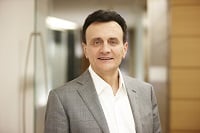 |
| AstraZeneca CEO Pascal Soriot |
In announcing first-quarter earnings Thursday, AstraZeneca CEO Pascal Soriot sounded as if he'd been reading the deluge of trend stories analyzing pharma's latest spate of M&A and the whole "go-big-or-go-home" premise. He certainly was well-versed on this week's talk about a potential megamerger with Pfizer ($PFE).
Soriot tried to damp down speculation about the latter: "[L]arge mergers and acquisitions sometimes can work but often are very disruptive," he said (as quoted by The Guardian).
As to the former? He's all for it. In fact, he's ready to participate, with a couple of sales/spinoffs together worth about $15 billion, according to analysts.
Soriot praised the complicated asset swap between GlaxoSmithKline ($GSK) and Novartis ($NVS), announced on Tuesday--the deal that prompted analysts to postulate about a shift in pharma M&A, toward an accentuate-the-positive approach. Shed the weaker operations, build up the stronger.
And then, Soriot essentially restated the analysts' thesis: "What you are likely to see from us is a continued focus on what we do well," he said during Thursday's earnings call with analysts. "We can't do everything ourselves."
And this: The GSK-Novartis swap was "a win-win for both companies," he said. "It is certainly the kind of thing we ourselves are considering."
Which brings us to his proposal to hive off AstraZeneca's ($AZN) anti-infective and neuroscience businesses, or find partners to help build them up. With drugs such as the lung infection fighter Synagis and the now-off-patent antipsychotic Seroquel, those two units bring in about $3.7 billion annually--and as such could be worth about $15 billion on the market, Panmure Gordon analyst Savvas Neophytou said.
As for the company's Q1 numbers, they looked promising enough to justify Pfizer's reported interest in a $100 billion buyout. Sales grew by 3% at constant exchange rates--flat as reported--thanks in part to growth in emerging markets. AZ's buyout of Bristol-Myers Squibb's ($BMY) share of their diabetes partnership helped, too. Though earnings dropped, the company cited increased R&D expenses as one reason. With several potential products moving into Phase III, that's understandable.
Q2 won't be nearly as pretty, because AstraZeneca's stomach drug Nexium goes off patent at the end of next month. Still, Edison Investment Research analyst Mick Cooper sees past that obstacle. "AstraZeneca has been in transition, with much business and product development under way but little as yet is really visible," he said in an investor note. "We think AstraZeneca will return to growth faster than many believe, which underlines Pfizer's opportune timing."
Some analysts are confident Pfizer will make a second attempt to woo AstraZeneca. That remains to be seen. In the meantime, we'll keep an eye on those two up-for-grabs units. Soriot says he means to move quickly. Stay tuned.
- see the AstraZeneca press release
- get more from The Guardian
Special Reports: Top 10 pharma companies by 2013 revenue - AstraZeneca | Pharma's top 10 M&A deals of 2013 - AZ/BMS diabetes partnership